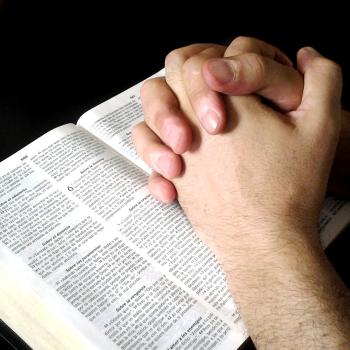Right smack in the middle of Jesus’ opening words of the Sermon on the Mount, there is this intriguing line:
“Blessed are the peacemakers, for they will be called children of God.” (Mt 5.9)

Image via Pixabay
Sounds good to me! I’m in. I want to be called a child of God, and peace sounds real good, so I’m all for it.
(I know it’s unwise to be so controversial on the Internet, but I have to be true to my convictions. Peace = good. If you don’t like it, feel free to unfriend/unfollow.)
The question, of course, is how? How do I “make peace” and so become a “peace-maker?”
Because a distinction needs to be made between being a peacemaker and being a peacekeeper.
Peacekeeping is probably something much more common for most of us.
Peacekeeping is when we are seeking to avoid or tamp down conflict. We don’t want conflict to erupt. It’s a valid and crucial quality in certain scenarios, such as for law enforcement officers, who seek to deescalate conflict to protect the public.
But outside of scenes like this, peacekeeping in our lives often includes an effort to maintain the status quo, to try not to rock the boat, to avoid ruffling too many feathers, to keep things calm.
The problem with peacekeeping is that sometimes conflict needs to happen. Sometimes the boat needs to get rocked, sometimes the status quo needs to get upturned. Sometimes someone needs a good feather-ruffling. Sometimes a person or a problem needs confrontation, a hard truth needs to be spoken, injustice needs challenging.
Refusing to do these things, in the name of “keeping the peace,” is not what we are called to do. It might feel good, but it often comes from a place of fear and not faith.
Peacemaking is harder.
As the term suggests, peacemaking means to create peace – to be agents of peace where there is strife, to bring healing, reconciliation, justice, wherever it is needed.
It means not avoiding conflict, but fully wading into conflict, paying a price to do so, sacrificially offering yourself as part of the solution. Where there is fear, anxiety, anger, division, etc., peacemakers seek to be used by God to establish His peace wherever they go.
This is challenging, but still sounds pretty good. If I can bring two feuding parties back together, or I can help someone find peace with God or neighbour, or if I can help those in need to find peace as justice is established, it still sounds very exciting.
The additional challenge, though, and one that Anabaptists would emphasize, is that peace isn’t merely the end goal – it is also the means by which the goal is achieved.
We don’t seek to make peace through any non-peaceful means.
Most famously this shows up in Anabaptist views of non-violence (this column has previously explored that issue here). We don’t seek to end conflict through violence, but through peaceful methods.
However, beyond just violence, it applies to every area of life. To every marital conflict, to every disagreement on theology, to every family issue, to every workplace drama, to every church problem, to every political division, we seek to use peaceful means to make peace.
If our methods are causing damage, even if non-violent, then we seek and find a different, more peace-filled path.
We call out sin, injustice or error when we see it, even when we see it in positions of power (e.g. 1Sam 24.8-13; 2Sam 12; Lk 3.19-20; 1Cor 5; 2Tim 4.2; etc.).
We seek to engage in every problem from a place of love, using words and tactics consistent with the way of love (1Cor 1.1-13), because “love does no harm to a neighbour,” (Rom 13.10).
We love even our enemies (Mt 5.43-48), and honour all people as fellow image-bearers of God (Gen 1.27).
We place a high value on taking the initiative in reconciling relationships (Mt 5.23-26).
We seek to engage in conversations and debate and disagreement in ways consistent with the fruit of the Holy Spirit (Gal 5.22-23).
We leave retribution in the hands of the LORD (Rom 12.19).
We forgive, not because they deserve it, but because we have been forgiven (Col 3.13).
We seek to let our gentleness be evident to all (Phil 4.5).
We make “every effort” to this end (Eph 4.3), understanding that we can’t truly establish peace by using non-peaceful methods, and so we seek to use the ways of peace as the very means of achieving peace.
Our Lord is called the Prince of Peace (Isa 9.6), and His Kingdom is a kingdom of peace (Rom 14.17). We who follow Jesus desire to live out these ways in all things, and in so doing, to “make” peace wherever we go.
















